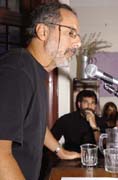Director's TV film portrays Jewish resistance to Nazis
'Risky Business' producer Jon Avnet talked about last year's NBC miniseries 'Uprising.'
The Daily Pennsylvanian
October 21, 2002
Jon Avnet is not your typical Hollywood film director or producer. For his latest project, last year's television miniseries Uprising, Avnet spent eight years researching the ghetto uprising in Warsaw, Poland, among other Holocaust subject matter.
On Friday, he brought his experiences to the Kelly Writers House, where students watched a screening of the two-part series. Writers House Director, English Professor and lecture moderator Al Filreis deemed Avnet "a student of the Holocaust" for his academic interest in and scholarly research on the topic.
Addressing a packed house of students and faculty, Avnet touched on a variety of topics, including his films and career, the role of the media in society and the Arab-Israeli conflict. But the chief focus of his two-hour talk was the lecture's title, "The Holocaust, the Media and Propaganda."
According to Avnet, Nazis used media to both document their murderous acts and to project certain images to the public. He cited "the incredible power repetition has" in converting subjective ideas into what were perceived as absolute truth. One of these media-created truths, Avnet explained, was the idea that Jews passively accepted Nazi oppression and victimization.
Uprising, however, aimed to portray Jewish resistance to Nazi persecution. The film pays tribute to the participants of the 1943 Warsaw Uprising who, according to Avnet, "wanted to chose how they were going to die -- and in that they were truly living."
Avnet also stressed the importance of maintaining historical accuracy in Uprising over catering to Hollywood entertainment norms.
"I wanted the story of the Warsaw ghetto in their own words," he said.
While researching for the film, Avnet traveled to Yad Vashem in Jerusalem, among other sites of Holocaust remembrance. In Jerusalem, he experienced one of "the saddest moments of [his] research."
"When I saw the Hall of the Righteous [a tribute to gentiles who helped save Jews during the Holocaust]... I said, 'Wow, it's so small,'" Avnet said.
The film also attempted to, in the words of Filreis, provide a "metacommentary on how the media does what it does." Avnet said that "all media is the media truth," and condoned "our satisfaction to sit back on the Western media."
In addition to Uprising, Avnet is famous for producing such varied films as Fried Green Tomatoes, Mighty Ducks, Up Close and Personal, The Three Mustekteers and Risky Business.
Avnet said he chose to devote his life to film because of its unique voice.
"I chose film because I wanted to have a voice that was less political and more emotional and humanitarian," he said. "I have extremely little faith in politics."
A Penn graduate, Avnet periodically returns to campus to share his experiences and to offer advice to students. College senior Marc Sinoway, for one, seemed to find Avnet's talk valuable, commending "how much of the director's life was invested in the film."
Avnet currently serves as vice-chairman of the board of directors for the American Film Institute and has produced more than 50 motion pictures and TV movies.

